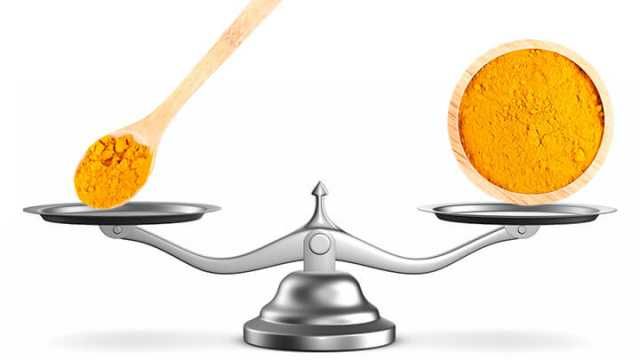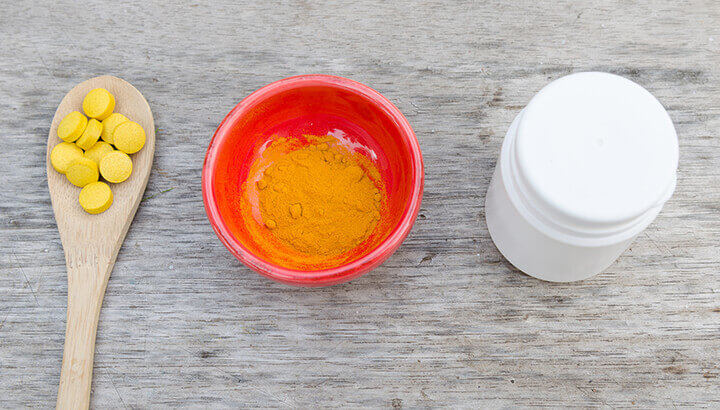
First of all, let me state for the record that I absolutely love turmeric. Whenever I am walking through a city and get a whiff of warm, savory curry, I immediately want to track down the source. I have found some of my favorite Indian restaurants this way! I also love turmeric in spice rubs, sweet dishes and beverages. It’s safe to say that it’s one of my favorite spices of all time.
Along with being delicious, turmeric is also incredibly healthy. It’s so healthy that many people take turmeric — or its active compound, curcumin — in supplement form. There are a great many reasons to do so (more on that below), but how much is too much?
While I’m happy to report that it would be quite difficult to get too much turmeric in regular food doses, there are upper limits when it comes to supplements. If you have too much turmeric over a long period of time, dangerous health effects can occur.
But, before we get into that, let’s take a look at some of the wonderful benefits of this spice.
The many health benefits of turmeric

Turmeric, both in its fresh form and in its dried and ground form, contains a wealth of nutrients. These include vitamin B6, fiber and the minerals copper, iron, manganese and potassium. Along with these nutrients, turmeric is very high in antioxidants. One of these is a polyphenol known as curcumin, which has been found to have a great many anti-inflammatory benefits.
A 2014 article published in the Journal of HerbMed Pharmacology reviewed existing research on the benefits of curcumin. On the results of their review, the study authors wrote:
“Recent studies have authenticated the use of turmeric for various diseases especially oxidative stress induced ones such as cancer, diabetes mellitus and inflammatory disorders. It also is used as hepatoprotective, nephroprotective, anticoagulant and anti-HIV to combat AIDS. Curcumin, as a spice, exhibits great promise as a therapeutic agent. It has very low toxicity, too.”
On top of that, turmeric has also been found to:
- Boost immune system function
- Improve regulation of cell signaling
- Relieve inflammatory pain (such as joint pain)
- Lower blood pressure
- Improve cognitive function
- Lower the risk of cardiovascular disease
- Improve digestive disorders
That’s a whole lot of benefits for one delicious spice. However, before you get carried away with the supplements…
How much turmeric is too much?

Luckily, the risk of suffering side effects from eating turmeric, or taking it as a supplement, is quite low unless you ingest a huge amount. According to information compiled by WebMD, people may experience nausea, upset stomach, diarrhea and dizziness in rare cases. WebMD also reports on one instance where a person experienced abnormal heart rhythm after taking over 3,000 milligrams of turmeric in a day, but also states that it isn’t clear whether turmeric itself was the cause. WebMD also states that supplementing with turmeric may be unsafe during pregnancy.
Other reports state that some people taking more than 1,000 milligrams of turmeric per day may experience digestive issues, and that 450 milligrams or more per day may lead to nausea and headaches for a few individuals. As a general rule, it has been established that “acceptable intake level” for curcumin itself (not just turmeric, but the concentrated compound) is 1.4 milligrams per pound of body weight.
According to the website Turmeric for Health, people should consume no more than three grams of fresh cut turmeric root or dried, ground turmeric root per day. Of course, to be safe, talk to a health professional you trust about the dose to be sure it’s appropriate for your individual health; it may adversely affect individuals with certain health conditions, especially in high supplement doses. Also, don’t exceed the dose recommended on your supplement, unless you get a go-ahead from a trusted physician.
Make sure you’re getting pure turmeric
When choosing turmeric, either for cooking or for supplementation, buy smart. Some turmeric powders and supplements may have fillers that may be toxic, as well as artificial colors and even lead. Other products may be made from old or rotting turmeric root. To avoid this, get to know your source; read reviews, ask friends and health professionals for advice on where to get turmeric, and do as much research on the company as you can. That way, you’ll be safe and enjoy maximum benefits from your turmeric.
How to include turmeric in your meals

Aside from the tried, true and delicious curry, the following are a few more ways to get turmeric into your diet:
- Add some fresh turmeric root to a smoothie
- Try some golden milk
- Use a dash of turmeric in your next dessert
- Add turmeric to gluten-free pancake batter
- Add some ground turmeric to homemade salad dressings and sauces
- Use turmeric in spice rubs for grilled grass-fed meats and organic veggies
- Add ground turmeric to Greek yogurt for a great dipping sauce
Oh, one more thing: turmeric becomes more bioavailable when you add some black pepper to it. Make sure to combine these two great spices in your recipes whenever you can!
For 5 More Reasons to Eat Turmeric EVERY Day, Click Here =>
– Tanya Mead

